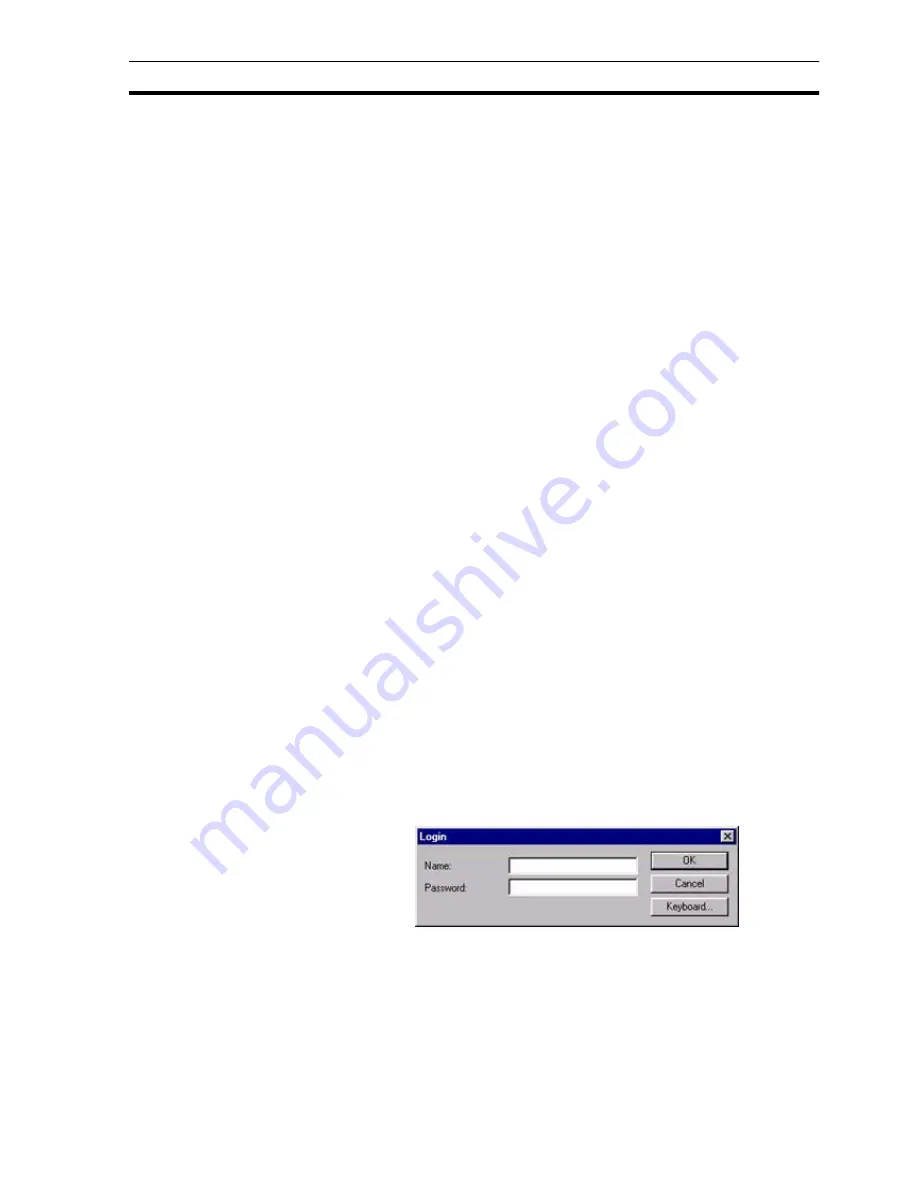
Runtime Security
SECTION 6 Projects
99
By default, there are four previously defined users listed in the Configured
Users: field: Designer with designer-level privileges, Manager with manager-
level privileges, Operator with operator-level privileges and Supervisor with
supervisor-level privileges. 'Web access' is an additional privilege, it allows the
user to log on to the Standard Web Pages.
1, 2, 3…
To add a new user:
1. Click the
Add
button. The User Attributes: fields and buttons become
enabled, and the contents of all fields are cleared, ready for a new user to
be added.
2. Type the full name of the new user in the Full Name: field.
3. Type a login name in the Login Name: field.
4. Type a user password in the Password: field. The password must be at
least four characters in length.
5. Select a level of privilege from the Security Level: drop down list.
6. Click the Store button to add the new user to the Configured Users: list, or
the Cancel button to abort the operation.
1, 2, 3…
To modify an existing user:
1. Select a user from the Configured Users: list and click the Modify button.
The User Attributes: fields and buttons become enabled, with the contents
of all the fields filled with the attributes of the selected user.
2. Amend the full name, login name, password and level of privilege in the
same way as adding a new user.
3. Click the Store button to update the user in the Configured Users: list, or
the Cancel button to abort the operation.
1, 2, 3…
To remove a user from the Configured Users: list:
1. Select a user from the Configured Users: list and click the Delete button.
2. A confirmation dialog box opens. Click the Yes button to remove the
selected user or the No button to abort the operation.
When all user amendments are complete, click the
Close
button.
In the runtime application, to make use of the designated privilege, the user
must log in. Login can be accessed in a variety of ways, and so is dependent
on the setup of the runtime application. Some applications may require login
as soon as the application is run, others may allow login from a context-
sensitive floating menu. Refer chapter 9, Animation for further information. The
Login User dialog box is as follows:
To log in, enter the login name (not the full name) in the Login Name: field and
the associated password in the Password: field. Any characters typed in the
Password: field are disguised by a '*' symbol for each character typed. Click
the OK button to log in or the Cancel button to abort.
For users without a keyboard to enter login details, select the
Keyboard
button. The login name and password can be constructed from the
subsequent dialog box by clicking on each button in turn, followed by the
Enter
button to complete.
Summary of Contents for CX-Supervisor
Page 1: ...CX Supervisor Software Cat No W10E EN 01 User Manual Software Release 3 1...
Page 3: ...Copyright Notice 2...
Page 16: ...15...
Page 17: ...16...
Page 27: ...Tip of the Day SECTION 1 Graphics Editor 26...
Page 35: ...CX Supervisor Preferences SECTION 2 Pages 34...
Page 79: ...Responding to Events SECTION 5 ActiveX Objects 78...
Page 115: ...Printing the Graphics Library SECTION 7 Graphics Library 114...
Page 181: ...Data Logging SECTION 11 Data Logging 180...
Page 201: ...Examples SECTION 12 Databases 200...
Page 243: ...Performance Monitor SECTION 16 Application Analysis Performance Monitor 242...
Page 253: ...Using with Omron s CX Server OPC SECTION 17 Using CX Supervisor as an OPC Cli 252...
Page 259: ...Creating a CX Supervisor Client application SECTION 18 Connecting to a remote CX 258...
Page 263: ...Adding a Point Linked to a Parameter SECTION 19 Connecting to Omron Industrial 262...
Page 271: ...Data Logging SECTION 20 Best Practices 270...
Page 275: ...Configuring a Server PC running Windows NT or 2000 Appendix A Configuring a PC 274...
Page 277: ...Appendix B Frequently Asked Questions 276...
Page 296: ...Appendix B Frequently Asked Questions 295...
Page 297: ...Appendix B Frequently Asked Questions 296...
Page 298: ...Appendix B Frequently Asked Questions 297...
Page 299: ...Appendix B Frequently Asked Questions 298...
Page 333: ...Revision history 332...






























